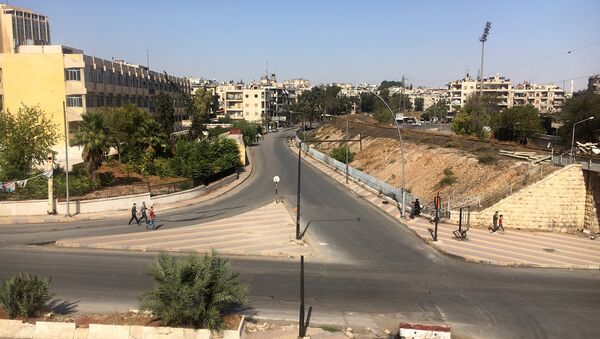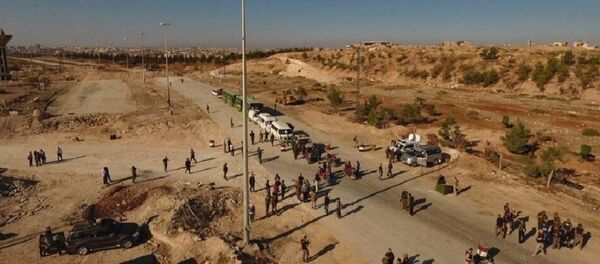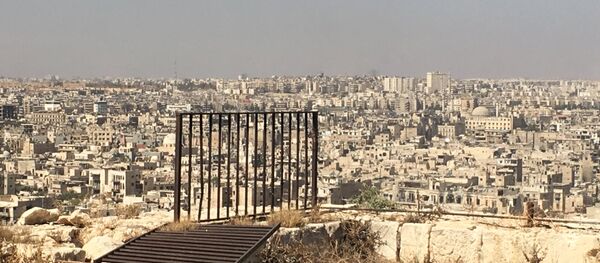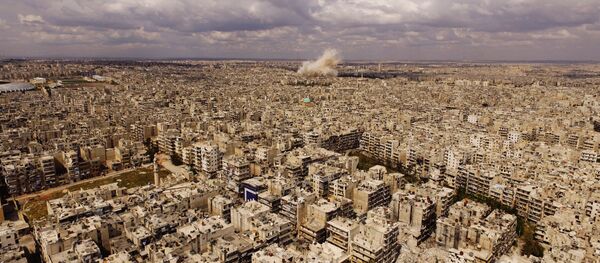The “humanitarian pause” in attacks was introduced in Aleppo at 08:00 local time (05:00 GMT) on Thursday to ensure the safe evacuation of unarmed militants and civilians from eastern Aleppo via eight designated corridors.
Earlier in the day, Russian Defense Minister Sergei Shoigu announced that Moscow had decided to extend the humanitarian pause in Aleppo for another 24 hours.
RIA correspondent, Mikhail Alaeddin was present on the ground in Aleppo and witnessed the evacuation before the “humanitarian pause” was implemented.
Successful preparation
According to the correspondent, the Security Service, police and civil defense officers began to prepare for a “humanitarian pause” a few days before the scheduled time.
The place from where the civilians and insurgents were supposed to leave had a festive atmosphere. There were fluttering national flags attached to the vehicles, policemen were smiling and a few hundred meters behind the cordoned area there were ordinary citizens gathered hoping to see how the evacuation proceeds.
Near the corridor there were many buses with curtained windows and many ambulances. The police were ready and waiting on the spot on Monday.
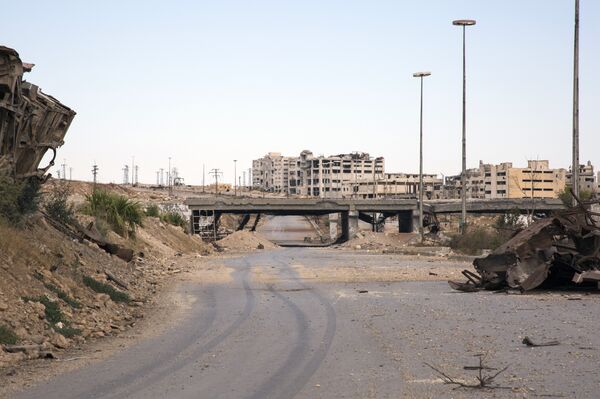
Alaeddin noted that the authorities hoped that the militants and citizens will come out earlier ahead of the scheduled time because the residents of Aleppo were sent daily messages on their mobile phones in order to inform them about the timing of the implementation of the “humanitarian pause.”
“Militants! Amnesty is guaranteed to you. Enough of blood shed of your compatriots. Lay down your weapons, come out and you will save your life and the lives of others,” Alaeddin read the message which he received on his phone.
“I think today will be the beginning of the end of the battle for Aleppo, I know that many people want to go out and militants want to give up. I feel we will have a good day,” officer of the Syrian Army, Iyad, told the correspondent in a comment.
According to the correspondent the drive to the corridor was extremely difficult. However, in the district close to the designated corridor, the atmosphere was electrifying.
There were farmers who had set up their stalls selling vegetables and fruits. A large number of cars were trying to squeeze through the people and sirens were blazing loudly.
Mine attack out of nowhere
The first hour passed without any events but then suddenly the mood began to visibly deteriorate. Mortar fire flew out of nowhere. People started moving under cover in order to avoid getting hit.
Alaeddin describes hiding in the nearest shelter with an officer and within the next hour, six more mortar attacks occurred at different distances.
“I take it back. I think no one is coming because the terrorists are ready to attack and no one will be allowed to come out,” Iyad exclaims from under cover.
The security officer decided to take the car and the ambulance to a safe distance. Using the loudspeakers, the military asked the citizens not to come any closer to the corridors.
The north is silent
Alaeddin with his team and officers had to leave the district and head toward the north, to the Castello highway. There were a few humanitarian corridors over there as well which the team wanted to make sure were not under attack.
As they left the city, the correspondent described seeing a lot of journalists, representatives of civil defense and police gathered together.
Shortly afterwards, information was received suggesting that a group of militants has asked to be allowed to leave through the corridor in Castello, provided that no one would search them and they would be given several vehicles with first aid to care for their wounded.
The police and the Syrian officers started fussing trying to reach an agreement. They gave their intermediary consent through a middle man and a group of doctors and civil defense made their way toward the defense route.
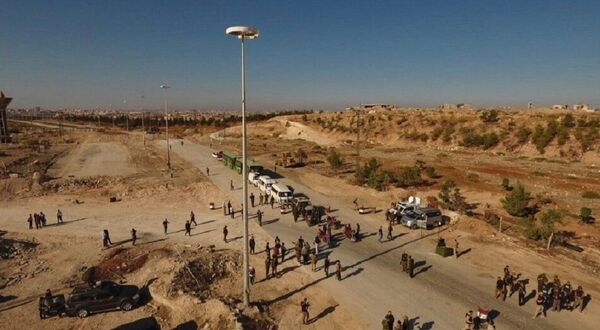
The journalists upon hearing this arrangement prepared cameras and written material, ready to tell the whole world about extraction of the first group of militants.
Half an hour later hope died once again and the group returned with nothing. The arrangement did not work out.
Humanitarian pause ends with firing
The situation in the Bustan al-Qasr district is constantly volatile. The militants opened mortar fire again as soon as the Sunni religious leaders asked civilians and militants to leave the territory of the radicals using a speaker.
This time the mortar fire fell near the soldier’s shelter and one of the soldiers received shrapnel wounds. His comrades immediately rushed to help him and put him in an ambulance.
Just a few minutes later, in short intervals, groups of two to three people started coming to the main checkpoints. According to the correspondent, the wounded militants belonged to Ahrar al-Sham radical group. Only about ten people showed up with the militants asking to be to send to Idlib.
The correspondent explained that the militants were firing using small artillery and also from heavy machine guns.
Alaeddin said that on the spot where just fifteen minutes ago there were journalists and ambulances now there was no one. Then, the military that was responsible for this stretch of the road was left behind together with the RIA correspondent and several of his Russian colleagues. Everyone else left.
“So much for the ‘humanitarian pause’ and the terrorist’s response to it. Now I think no one will leave. It is time to go home and maybe tomorrow will be a different day,” Iyad told the RIA correspondent.

